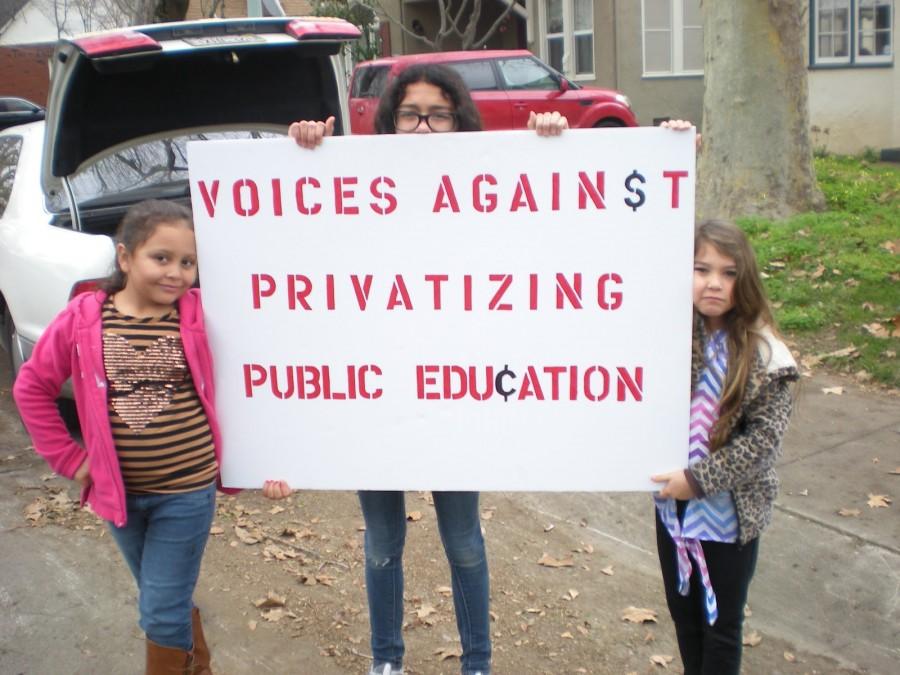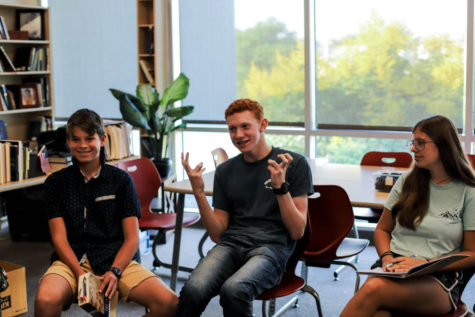Ballot Initiative to repeal the CA Charter School Act of 1992
For over 20 years, charter and public schools have coexisted. Classical Academy, Escondido Charter, and Guajome Park Academy are just a few of the independently run public schools in Escondido alone. However, an activist group known as Voices Against Privatizing Public Education wants to change that.
The group has started an initiative to repeal the 1992 Charter School Act, saying that charter schools “privatize” education, promote “cherry picking” students and do not fairly serve communities. If the Act were to be repealed, every charter school in California, including Classical Academy High School, would be converted into a traditional public school and placed under the control of its local school district.
In order for the initiative to have impact, it would need to get more than 400,000 signatures on paper, and the group has not yet begun to circulate a paper petition, although many signatures have been collected online. Once a paper petition is created, only 150 days are allotted to get the required number of signatures. If this number is met, then the issue will be placed on the ballots in November for California voters to decide. If the initiative passes, then all public charter schools will be required by the state to close or transition into a traditional public school by 2017.
Mr. Cameron Curry, the Executive Director of the Classical Academies, has called on students and parents at the Classical Academies to write letters to Governor Brown sharing their experiences at Classical. Called “Letters to Leaders,” the movement seeks to show how charter schools are making a difference and a positive impact in the lives of their attendees.
Mr. Dana Moen, CAHS principal, says that while this could be threat to charter schools if it gets on the ballot, charter schools supporters should not be concerned.
“I don’t think anyone needs to panic, because charter schools are likely going to stay. [I]f [the initiative] gets on the ballot, then yeah, we’ll really have to stand up for charter schools…I’ve never personally fought an initiative before it’s on the ballot…but maybe that’s what we have to do.”
Mr. Moen did say that it was important to spread awareness about the positive impact charter schools make. “I think we [should] just keep telling our story of the good things that charter schools are doing, so that if it was to get on the ballot, then it would be soundly defeated.”
The idea for charter schools was originally conceived by Professor Ray Budde at University of Massachusetts Amherst in 1974 as public schools free from many of the state and district’s school laws. These schools would operate as legally and financially autonomous public schools, free of religious affiliation, tuition or selective student admissions, and would be focused more on the outcomes of the students than fulfilling educational attainment requirements.
The state of California first permitted charter schools to open in 1992 with the Charter School Act. It was the second state to authorize the creation of charter schools, following Minnesota, which allowed charters to open the previous year. However, since then, charter schools have been given permission to open all over the United States; according to the Center for Education Reform, 42 states and the District of Columbia have laws permitting charter schools. The Classical Academy first opened in 1999 to serve students and parents in the North County area of San Diego.
Unlike comprehensive public schools, many charters offer smaller, more intimate environments, with more flexibility and experimentation available in their approaches to education. Unlike those at comprehensive schools, teachers on charter campuses do not typically belong to unions, and they do not have tenure, meaning that those teachers may be replaced at any time for any reason. In regards to funding, while a public school can easily pass a bond and receive facility funding from all the property owners in their area through taxes, charters can’t receive the same funding unless the bond being passed includes both charters and public schools.
Because of charters schools’ exemption from much of the state’s ed-code, charter schools run much like private businesses; they have much more freedom in decision making than public schools, who must meet the necessary requirements for California’s ed-code laws. Various organizations—Voices Against Privatizing Public Education (VAPPE) included—see this freedom coupled with the prosperity of charter schools, and have thus accused charters of “privatizing” public education. According to VAPPE, charter schools “cherry-pick” their students and only admit those who are high-performing, thereby failing to serve students of all backgrounds. However, publicschoolreview.com shows that the test scores for minority students who attend public charter schools are 5% better, and, as Mr. Curry, explains, “We are open to anyone who would like to come, whether you are highly-gifted, whether you are underachieving, whether you require special needs or services. We are open to every student who knocks on our door.”
Amongst other things, VAPPE’s online petition claims that charter schools “falsify records, commit enrollment fraud, [close] down community schools, destroy jobs, bust up unions and segregate students” (laschoolreport.com). Several charters in California have also undergone lawsuits from public school districts for what they claim are “illegal arrangements” between charters and the state. In addition to this, other have charters received cease-and-desist letters from San Diego Unified for serving students outside of the areas in which they have been authorized. With more than 80 of these “out-of-district” charter schools, San Diego County is definitely a battleground for clarifying laws for and legality of charters.
However, the debate about charter schools is not just in California. In Washington state, similar arguments have occurred over whether or not charter schools should be legal, culminating in a state supreme court decision that charter schools are unconstitutional. Washington’s nine charter schools are scheduled to be shut down by the end of the year. Though the number of charter schools there (9) is small in comparison to the number in California (1230), the issues that are at stake remain the same.
Those in favor of charter schools claim that charters make it a priority to provide a nurturing environment where learning is key. Student David Zhou is a beneficiary.
“Charter schools [are] willing to provide a safe and mutually competitive environment where the teachers also wor[k] together to provide an education,” he said, one “where students would learn to better themselves through peer-to-peer and teacher motivation rather than unhealthy competition. There is a much more tight knit student body and much acceptance in areas where people may otherwise face stigma.”
Supporters of closing charter schools argue that the selectivity of charter schools creates an unfair advantage for students who may have less academic achievement.
The issue of charter schools is a complicated one, and one that directly affects the students here at CAHS. For students wishing to get involved, the school suggests that students write letters to Sacramento with their views on the issue. (This can be done by emailing a letter to [email protected].) For now, the charter schools in California can only watch and wait to see what happens next.
EDITOR’S NOTE (3.10.16): Turns out Del Lago Academy isn’t a charter school. Mr. Cameron Curry informed us and we adjusted accordingly.








